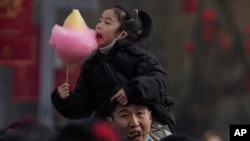A slowing economy is prompting Chinese shoppers to reassess their free-spending habits during this year’s Lunar New Year, traditionally the country’s most important shopping season.
Analysts and shoppers say that this year, young Chinese consumers especially are focusing more on "cost-effectiveness" when buying clothing, accessories, food, and electronic products.
Xu, 31, who works for a state-owned airline in Beijing, says that in the past, her income was high and she would spend on travel, entertainment and eating out. But since the pandemic and China’s strict lockdown measures, her income has become unstable. She says life has not been too difficult but overseas travel is no longer an easy option.
And while consumers have less to spend and prices are rising generally, Xu says there are still bargains to be found. Set meals for groups in restaurants, for instance, cost about half of what they did before the pandemic even though the quality of food and service is unchanged.
"When you have the concept of living within your means, you will become sensitive to prices," she says. "The most popular things on the market now are those with functional needs and can make you look good, but at the same time, they are cost-effective."
Xu says that a few years ago, young people in Beijing pursued "exquisite poverty" —meaning that even though their pockets were not that deep, they spent on luxury goods from famous brands — resulting in poor housing conditions or quality of life. But, she says, not many people do that anymore.
Xu requested that VOA Mandarin not use her full name so she could speak more freely on the topic. The economy has become another sensitive issue in China as it faces more challenges.
China had hoped that its economy would bounce back following the end of strict COVID-19 pandemic controls last year, but instead it is grappling with a range of problems including higher unemployment, rising prices and falling wages.
Wei, 33, works at a state-owned bank in Shanghai. She did not want to use her full name due to the sensitivity of the issue. She says one can see the signs of the economic slowdown in the vacant stores in shopping malls and the shift to e-commerce sites online and low-price high-quality products.
"Nowadays, people are not as keen on consuming luxury goods as before, which is understandable. When your expectations for the future economy are not so good, you definitely don't want to spend all your current money on expensive goods," Wei said.
She says both e-commerce platforms and offline brands are launching high-quality, affordable alternatives as consumers become more rational about cost.
China has long encouraged consumers to buy local products and at a high-level meeting on the economy late last year, the country’s leaders made boosting domestic consumption a key goal for 2024.
Ahead of the Lunar New Year, China’s Commerce Ministry announced it was rolling out more measures to boost the purchase of vehicles, household appliances and home furnishings, according to the official Xinhua news agency.
Chen Xinlei, a professor of marketing at Cheung Kong Graduate School of Business, says people shouldn't read too much into consumption downgrades in China.
He says that low prices are a global trend, and cost-effectiveness doesn't only exist in China, noting that discount stores came to China from the United States and Japan.
He says the rise of social media platforms has also helped young Chinese find their own identity and shun luxury goods. It is not because they cannot afford luxury goods, he adds, but because they lack individuality.
"People who can't afford it used to say, 'I'm envious. I hope to have a Hermès bag, but I can't afford it.' Nowadays, many young people say, 'I don't need this, why do I need it?'" Chen says.
"This has led to the rise of domestic products and so-called trendy brands. This is actually a way for them to find other identities to satisfy their unique needs."





